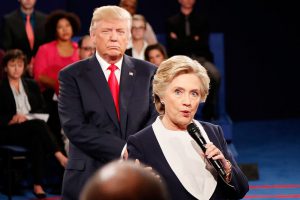“Islamophobia”
The debate on Sunday night, October 9, proved to be quite vicious as Clinton and Trump tried to out-insult the other regarding the scandals of their past. However, Trump managed to make himself look bad without the help of Clinton when an Islamic woman in the crowd stood up and asked him to describe what he would do about Islamophobia. Instead of offering a solution to Islamophobia, he turned the question on its head and blamed Muslims for not informing law enforcers about potential Muslim terrorists attacks in the U.S. Not only did this offend the woman, but Trump also most likely lost any of the Muslim supporters that he possibly had.
Vetting or Screening?
Trump did not stop here. He took it a step further and tried to smooth the lines of what he said, potentially realizing his mistake in pushing away potential voters with his rude comment. He declared that he has changed his position on the blanket ban on Muslim refugees and now feels that they should be allowed to enter the country, but only through extreme vetting. The question that many Americans are raising is what is the difference between extreme vetting and the screening that already takes place among the Muslims that enter the country? The use of the word “extreme” implies that the screening/vetting is going to be more intense than it already is. Therefore, another question arises. Has Trump really changed his view on the blanket ban or did he just say that to appease and gain voters? It sounds to me like he has not changed his opinion and is simply rephrasing it by using the words “extreme vetting”, which really means that he is going to use such harsh screening standards that VERY few Muslims will be “qualified” to enter into the country.
Video Link to “extreme vetting” question during debate
A Rhetorical Mistake?
The big mistake revolving around the Islamophobia question was that Trump did not follow the rules of full, partial, and non-answers. Trump’s response to the Muslim woman was a huge mistake because if he had instead said positive things about the Muslims, even if he did not completely agree with himself, he could have gained several Muslim voters. Instead, he flat out blamed the Muslims for the whole idea of Islamophobia and terrorist attacks. This was a time in the debate when he should have used the non-answer strategy, or stuck with a partial answer and only state the second part of his statement that he had changed his opinion on the blanket ban. Even then, it is possible that he deterred potential voters with the use of the word “extreme vetting”, but he at least shed some note of positivity by saying that he had decided to allow Muslim refugees to enter the country.
In conclusion, Trump’s misjudgment of when to use a non-answer and a partial answer caused deep damage to potential Muslim supporters. Once again, Trump’s impulsive mouth has lost him voters that he so desperately needs in November. Sometimes silence is a candidate’s best friend.
Source:
http:/http://www.theatlantic.com/liveblogs/2016/10/second-presidential-debate-clinton-trump/503495/


I think that Trump should’ve provided a clearer answer as to what “extreme vetting” means. I would’ve liked to see him to take a similar standpoint to KY Senator Rand Paul, who basically called for a pause on immigration from a number of countries, rather than a complete shutdown of an entire religious group. Trump kind of skirted around the question, and many media outlets are saying that he answered in an Islamophobic manner. Like you said, he probably lost (or never gained) potential votes because of this answer, but this is nothing new for Trump. If he could remain silent, or partially answer questions such as these, he would be much better off in a rhetorical sense.